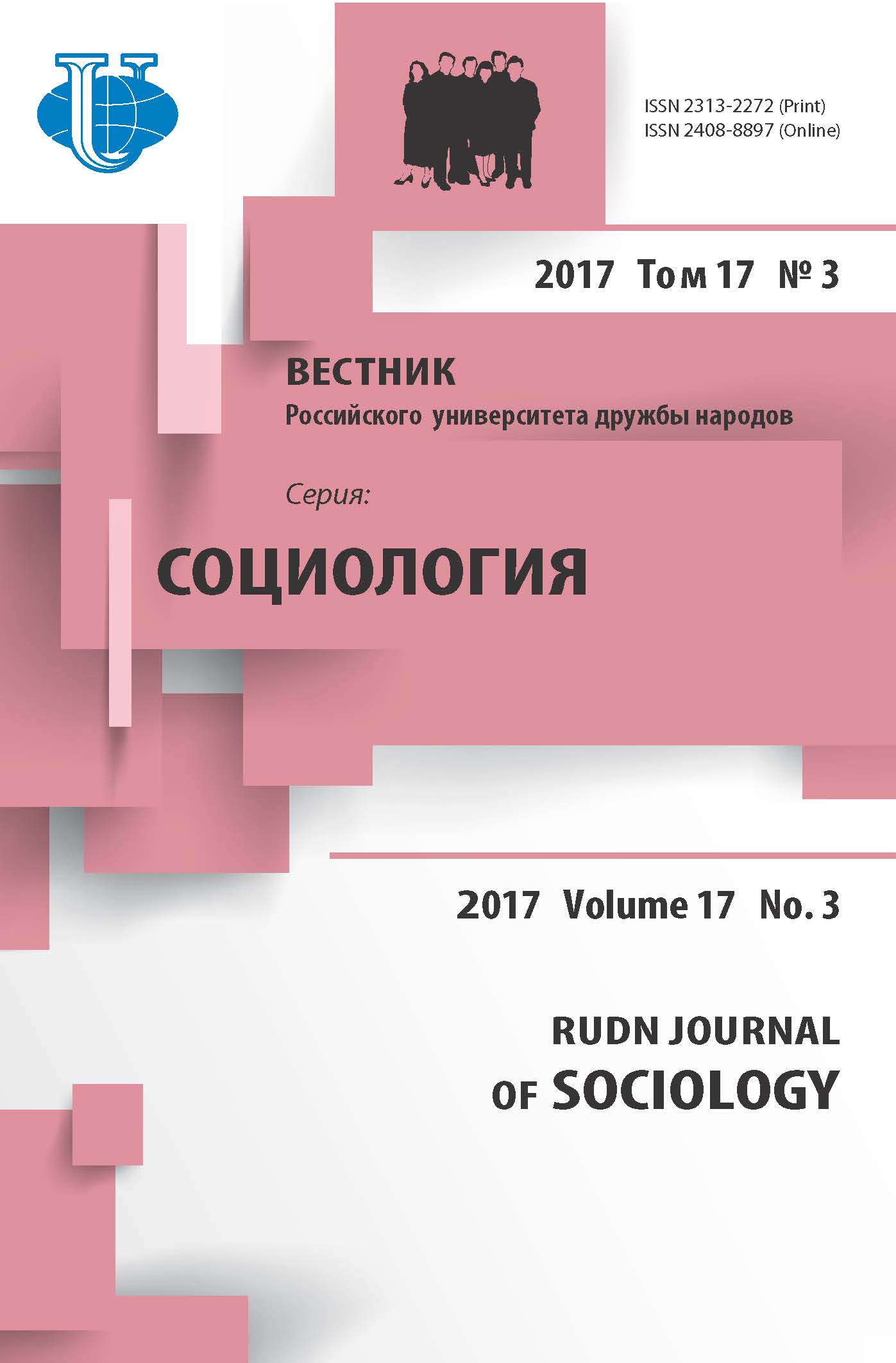SOCIAL ACTIVITY OF THE RUSSIAN YOUTH: THE SCOPE AND RESTRAINING FACTORS
- Authors: Sokhadze KG1
-
Affiliations:
- RUDN University (Peoples’ Friendship University of Russia)
- Issue: Vol 17, No 3 (2017)
- Pages: 348-363
- Section: Surveys, experiments, case studies
- URL: https://journals.rudn.ru/sociology/article/view/16807
- DOI: https://doi.org/10.22363/2313-2272-2017-17-3-348-363
Cite item
Full Text
Abstract
In recent years, both experts and public opinion tend to assess the involvement of the Rus-sian youth in social activities as rather low: the post-Soviet generations are called apolitical and indifferent to anything except personal well-being and interests. At the same time, the largest research centers (Public Opinion Foundation, Russian Public Opinion Research Center, Levada Center, and Institute of Sociology) conduct sociological studies of various aspects of social and civil activities, political participation and protest potential of younger generations and Russian society as a whole. The article presents some recent data that prove the low level of political and social activity of the Russian population. The author believes that this level is higher among the younger generations, especially the students. To prove that, first, the author considers the category ‘social activity’: its motives (primarily socially significant needs), subjective ‘measurement’ (personal needs and interests), goals (pragmatic and altruistic, collective and personal, etc.), forms (personal, collective, etc.) and external and internal factors. Secondly, to assess the motives and restraining factors of the youth social activity, the article presents some results of the surveys conducted in the RUDN University and of the Russian public opinion polls. The author identifies reasons for the youth’s lack of interest in public activities (lack of material benefits, desire/time/motivation, information, and nega-tive image of public associations), motives of social activity (social, selective, mobilization, etc.) and for be-coming a member of public associations (self-realization, the desire to change the world, combination of the two, etc.), and factors that determine the youth’s perception of social activity in general (estimates of so-cial situation, value orientations and social well-being).
About the authors
K G Sokhadze
RUDN University (Peoples’ Friendship University of Russia)
Author for correspondence.
Email: keti.sokhadze@gmail.com
Miklukho-Maklaya St., 6, 117198, Moscow, Russia
References
- Aktory dobrovol'chestva [Actors of volunteer movement]. 2014. http://fom.ru/TSennosti/11663 (In Russ.).
- Volkov D., Goncharov S. Potencial grazhdanskogo uchastija v reshenii social'nyh problem: svodnyj analiticheskij otchet [The Potential of Civil Participation in Solving Social Problems: A Consolidated Analytical Report]. Moscow; 2014 (In Russ.).
- Indeks “Grazhdanskaja otvetstvennost” [Index of Civil Responsibility]. 2014. http://fom.ru/ Obraz-zhizni/11691 (In Russ.).
- Kapto A.S. Social'naja aktivnost' kak nravstvennaja cherta lichnosti [Social Activity as a Moral Trait of Personality]. Kiev; 1968 (In Russ.).
- Kodzhaspirova G.M. Pedagogicheskij slovar' [Pedagogical Dictionary]. Moscow; 2000 (In Russ.).
- Koryakovtseva O.A. Gosudarstvennaja molodezhnaja politika kak faktor obshhestvenno-politi¬cheskoj aktivizacii molodezhi v postsovetskoj Rossii [State Youth Policy as a Way to Activate the Post-Soviet Younger Generations]. Yaroslavl; 2010 (In Russ.).
- Molodezh' i politika: tochki soprikosnovenija [Youth and Policy: Common Interests]. 2017. https://www.wciom.ru/fileadmin/file/reports_conferences/2017/2017-05-22_cennosti.pdf (In Russ.).
- Molodezh' o molodezhi. Molodezh' govorit o svoih osobennostjah i o trudnostjah v zhizni [Youth’s Opinion on the Youth: Its Features and Life Difficulties]. 2016. http://fom.ru/Obraz-zhizni/12832 (In Russ.).
- Narbut N.P., Trotsuk I.V. Repertuar strahov rossijskogo studenta: po materialam jempiricheskogo proekta [Russian students’ main fears: The results of an empirical study]. RUDN Journal of Sociology. 2013;4 (In Russ.).
- Nikolaeva A.A. Social'naja aktivnost' kak faktor formirovanija grazhdanskoj identichnosti sovremennoj rossijskoj studencheskoj molodezhi [Social Activity as a Factor of the Contemporary Russian Student Youth Civil Identity Formation]. Orel; 2012 (In Russ.).
- Obshhestvennoe mnenie—2016 [Public Opinion—2016]. Moscow; 2017 (In Russ.).
- Potapova S.A. Social'naja aktivnost' studencheskoj molodezhi sovremennogo molodogo go-roda (na materialah g. Nizhnekamska) [Social Activity of the Contemporary Young City’s Youth (Based on the Data from Nizhnekamsk)]. Saint Petersburg; 2005 (In Russ.).
- Revonenko A. Molodezh' apolitichna i pragmatichna: Eksperty o protestnom potenciale studentov [Youth is Apolitical and Pragmatic: Experts on the Students’ Protest Potential]. 2016. https://openrussia.org/post/view/18923 (In Russ.).
- Rossijskaja identichnost': my vmeste? [Russian Identity: Are We Together?] 2014. https://wciom.ru/ index.php?id=236&uid=115072 (In Russ.).
- Rossijskoe obshhestvo: god v uslovijah krizisa i sankcij: Informacionno-analiticheskij material po itogam obshherossijskogo sociologicheskogo issledovanija [Russian Society: A Year under the Crisis and Sanctions: An Information-Analytical Report Based on the All-Russian Socio¬logical Study]. Moscow; 2015 (In Russ.).
- Seregin A.N. Metodika issledovanija social'noj aktivnosti studencheskoj molodezhi [A Method to Study the Social Activity of the Student Youth]. Moscow; 2008 (In Russ.).
- Sokolova E.S. Strukturnyj podhod k ponimaniju motivacii social'noj aktivnosti molodezhi [Structural Approach to the Study of the Youth’s Motives for Social Activity]. Moscow; 2008 (In Russ.).
- Social'naja i politicheskaja aktivnost' molodezhi. Kakie vidy aktivnosti rasprostraneny sredi molodyh? [Social and Political Activity of the Youth. What are Its Common Types?] 2017. http://fom.ru/TSennosti/13286 (In Russ.).
- Trofimova I.N. Grazhdanskaja kompetencija: gosudarstvennaja politika ili vozmozhnost' dlja grazhdanina [Civil competence: State policy or citizens’ opportunities]. Rossija reformiru-jushhajasja. Vyp. 13: Ezhegodnik. Otv. red. M.K. Gorshkov. Moscow; 2015 (In Russ.).
- Trotsuk I.V., Sohadze K.G. Social'naja aktivnost' molodezhi: podhody k ocenke form, motivov i faktorov projavlenija v sovremennom rossijskom obshhestve [Social activity of the youth: Approaches to the assessment of forms, motives and factors in the contemporary Russian society]. RUDN Journal of Sociology. 2014;4 (In Russ.).
- Harlanova E.M. Razvitie social'noj aktivnosti molodezhi: tradicii i innovacii [The youth social activity development: Traditions and innovations]. Molodezh' v social'nom vzaimodejstvii: samorealizacija, social'naja aktivnost', integracija. Chelyabinsk; 2010 (In Russ.).
- Hristova I.Ch., Komarov E.G., Ischenko T.V. Puti formirovanija social'noj aktivnosti lichnosti pri socializme [Ways of Developing Social Activity of a Person under Socialism]. Moscow; 1972 (In Russ.).
- Tsvetkova R. Lev Gudkov: “Molodym v strane ne hvataet vozduha” [Lev Gudkov: “There is not enough air for younger generations in the country”]. 2016. http://www.ng.ru/ng_politics/ 2016-03-01/9_young.html (In Russ.).
- Šuvaković U.V., Narbut N.P., Trotsuk I.V. The youth of Russia and Serbia: Social trust and key generational problems. RUDN Journal of Sociology. 2016;16(4).














